人教版初中英语七年级下册Unit2语法指导与练习
- 格式:doc
- 大小:61.50 KB
- 文档页数:4

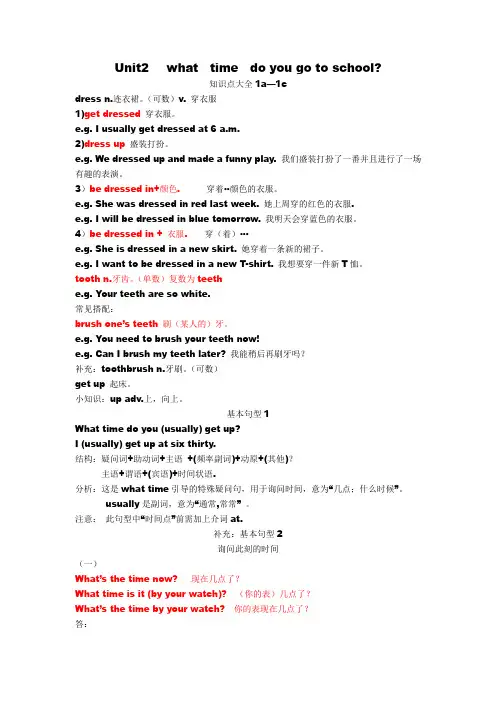
Unit2 what time do you go to school?知识点大全1a—1cdress n.连衣裙。
(可数)v. 穿衣服1)get dressed 穿衣服。
e.g. I usually get dressed at 6 a.m.2)dress up盛装打扮。
e.g. We dressed up and made a funny play. 我们盛装打扮了一番并且进行了一场有趣的表演。
3)be dressed in+颜色.穿着··颜色的衣服。
e.g. She was dressed in red last week. 她上周穿的红色的衣服.e.g. I will be dressed in blue tomorrow. 我明天会穿蓝色的衣服。
4)be dressed in + 衣服.穿(着)···e.g. She is dressed in a new skirt. 她穿着一条新的裙子。
e.g. I want to be dressed in a new T-shirt. 我想要穿一件新T恤。
tooth n.牙齿。
(单数)复数为teethe.g. Your teeth are so white.常见搭配:brush one’s teeth 刷(某人的)牙。
e.g. You need to brush your teeth now!e.g. Can I brush my teeth later? 我能稍后再刷牙吗?补充:toothbrush n.牙刷。
(可数)get up 起床。
小知识:up adv.上,向上。
基本句型1What time do you (usually) get up?I (usually) get up at six thirty.结构:疑问词+助动词+主语+(频率副词)+动原+(其他)?主语+谓语+(宾语)+时间状语.分析:这是what time引导的特殊疑问句,用于询问时间,意为“几点;什么时候”。
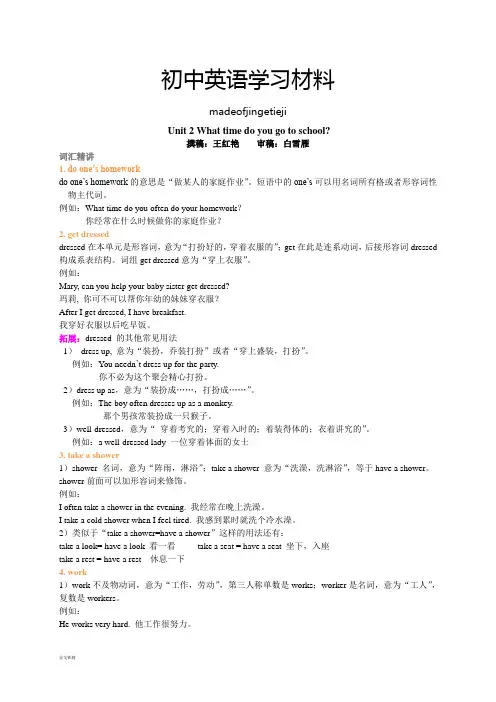
初中英语学习材料madeofjingetiejiUnit 2 What time do you go to school?撰稿:王红艳审稿:白雪雁词汇精讲1. do one’s homeworkdo one’s homework的意思是“做某人的家庭作业”。
短语中的one’s可以用名词所有格或者形容词性物主代词。
例如:What time do you often do your homework?你经常在什么时候做你的家庭作业?2. get dresseddressed在本单元是形容词,意为“打扮好的,穿着衣服的”;get在此是连系动词,后接形容词dressed 构成系表结构。
词组get dressed意为“穿上衣服”。
例如:Mary, can you help your baby sister get dressed?玛莉, 你可不可以帮你年幼的妹妹穿衣服?After I get dressed, I have breakfast.我穿好衣服以后吃早饭。
拓展:dressed 的其他常见用法1)dress up, 意为“装扮,乔装打扮”或者“穿上盛装,打扮”。
例如:You needn’t dress up for the party.你不必为这个聚会精心打扮。
2)dress up as,意为“装扮成……,打扮成……”。
例如:The boy often dresses up as a monkey.那个男孩常装扮成一只猴子。
3)well-dressed,意为“穿着考究的;穿着入时的;着装得体的;衣着讲究的”。
例如:a well-dressed lady 一位穿着体面的女士3. take a shower1)shower 名词,意为“阵雨,淋浴”;take a shower 意为“洗澡,洗淋浴”,等于have a shower。
shower前面可以加形容词来修饰。
例如:I often take a shower in the evening. 我经常在晚上洗澡。

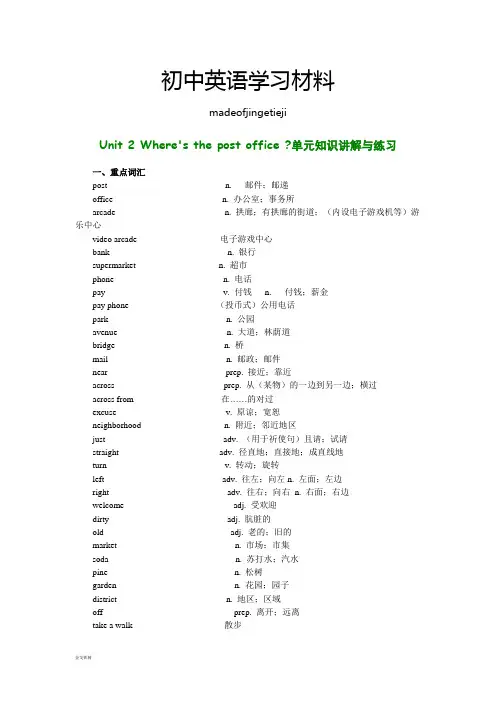
初中英语学习材料madeofjingetiejiUnit 2 Where's the post office ?单元知识讲解与练习一、重点词汇post n. 邮件;邮递office n. 办公室;事务所arcade n. 拱廊;有拱廊的街道;(内设电子游戏机等)游乐中心video arcade 电子游戏中心bank n. 银行supermarket n. 超市phone n. 电话pay v. 付钱n.付钱;薪金pay phone(投币式)公用电话park n. 公园avenue n. 大道;林荫道bridge n. 桥mail n. 邮政;邮件near prep. 接近;靠近across prep. 从(某物)的一边到另一边;横过across from在……的对过excuse v. 原谅;宽恕neighborhood n. 附近;邻近地区just adv. (用于祈使句)且请;试请straight adv. 径直地;直接地;成直线地turn v. 转动;旋转left adv. 往左;向左n. 左面;左边right adv. 往右;向右n. 右面;右边welcome adj. 受欢迎dirty adj. 肮脏的old adj. 老的;旧的market n. 市场;市集soda n. 苏打水;汽水pine n. 松树garden n. 花园;园子district n. 地区;区域off prep. 离开;远离take a walk散步through prep. 穿过;经过pass v. 经过;穿过;通过house n. 房子;住宅beginning n. 开始(的部分);起点tour n. 旅行;旅游;参观;游览visit n. 游览;参观fun n. 娱乐;乐趣if conj. 假使;如果hungry adj. 饥饿的bench n. 长凳;板凳arrive v. 到达;抵达taxi n. 出租车;的士;计程车airport n. 飞机场yours pron. (用在英文信件署名前)你的;你们的二、重点词组post office 邮局Excuse me. (打扰他人,不同意,迫不得已而失礼时的道歉)对不起。
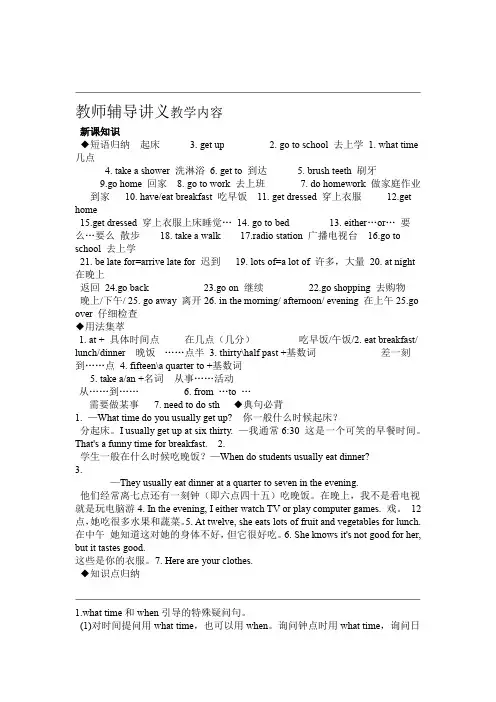
教师辅导讲义教学内容新课知识◆短语归纳起床 3. get up 2. go to school 去上学1. what time 几点4. take a shower 洗淋浴6. get to 到达5. brush teeth 刷牙9.go home 回家8. go to work 去上班7. do homework 做家庭作业到家10. have/eat breakfast 吃早饭11. get dressed 穿上衣服12.get home15.get dressed 穿上衣服上床睡觉…14. go to bed 13. either…or…要么…要么散步18. take a walk 17.radio station 广播电视台16.go to school 去上学21. be late for=arrive late for 迟到19. lots of=a lot of 许多,大量20. at night 在晚上返回24.go back 23.go on 继续22.go shopping 去购物晚上/下午/ 25. go away 离开26. in the morning/ afternoon/ evening 在上午25.go over 仔细检查◆用法集萃1. at + 具体时间点在几点(几分)吃早饭/午饭/2. eat breakfast/ lunch/dinner 晚饭……点半3. thirty\half past +基数词差一刻到……点4. fifteen\a quarter to +基数词5. take a/an +名词从事……活动从……到…… 6. from …to …需要做某事7. need to do sth ◆典句必背1. —What time do you usually get up? 你一般什么时候起床?分起床。
I usually get up at six thirty. —我通常6:30 这是一个可笑的早餐时间。
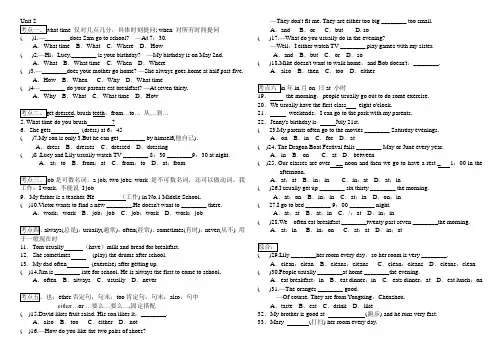
仅对几点几分,具体时刻提问; when 对所有时间提问 —At 7:30.A .What timeB .WhatC .WhereD .How( )2.—Hi ,Lucy.________ is your birthday? —My birthday is on May 2nd.A .WhatB .What timeC .WhenD .Where( )3.—________does your mother go home? —She always goes home at half past five.A .HowB .WhenC .WhyD .What time( )4—________ do your parents eat breakfast? —At seven thirty.A .WhyB .WhatC .What timeD .How get dressed, brush teeth ,from …to … 从…到… 5. What time do you brush ? 6.She gets (dress) at 6:45( )7.My son is only 3.But he can get ________ by himself(他自己).A .dressB .dressesC .dressedD .dressing( )8 .Lucy and Lily usually watch TV ________ 8:30 ________9:30 at night.A .at ;toB .from ;atC .from ;toD .at ;from 是可数名词,a job, two jobs; work 是不可数名词,还可以做动词。
我不能说 I job9.My father is a teacher. He (工作) in No.1 Middle School.( )10.Victor wants to find a new ________.He doesn't want to ________ there.A .work ;workB .job ;jobC .job ;workD .work ;jobalways(总是),usually(通常),often(经常),sometimes(有时),never(从不) 用11.Tom usually (have )milk and bread for breakfast. 12.She sometimes (play) the drums after school. 13.My dad often (exercise) after getting up.( )14.Jim is ________ late for school. He is always the first to come to school.A.often B .always C .usually D .never ether 否定句,句末;too 肯定句,句末;also ,句中 either…or …要么…要么…,固定搭配 ( )15.David likes fruit salad. His son likes it ,________.A .alsoB .tooC .eitherD .not ( )16.—How do you like the two pairs of shoes? —They don't fit me. They are either too big ________ too small. A .and B .or C .but D. so( )17.—What do you usually do in the evening?—Well ,I either watch TV ________ play games with my sister. A .and B .but C .or D .so( )18.Mike doesn't want to walk home ,and Bob doesn't ,________.A .alsoB .thenC .tooD .either 年in 月on 日at 小时. the morning ,people usually go out to do some exercise. 20.We usually have the first class eight o'clock.21. weekends ,I can go to the park with my parents. 22.Jenny's birthday is July 21st.( 23.My parents often go to the movies ________ Saturday evenings.A .onB .inC .forD .at( )24. The Dragon Boat Festival falls ________ May or June every year.A .inB .onC .atD .between( )25. Our classes are over __ noon and then we go to have a rest _ 1:00 in theafternoon.A .at ;atB .in ;inC .in ;atD .at ;in( )26.I usually get up ________ six thirty ________ the morning.A .at ;onB .in ;inC .at ;inD .on ;in ( 27.I go to bed ________ 9:00 ________ night.A .at ;atB .at ;inC ./;atD .in ;in( )28.We often eat breakfast ________twenty past seven ________the morning.A .at ;inB .in ;onC .at ;atD .in ;at ,so her room is very ________.A .clean ;cleanB .cleans ;cleansC .clean ;cleansD .cleans ;clean ( )30.People usually ________at home ________the evening.A .eat breakfast ;inB .eat dinner ;inC .eats dinner ;atD .eat lunch ;on ( )31.—The oranges ________ good.—Of course. They are from Yongxing ,Chenzhou. A .taste B .eat C .drink D .like32.My brother is good at (跑步) and he runs very fast. 33.Mary (打扫) her room every day.。
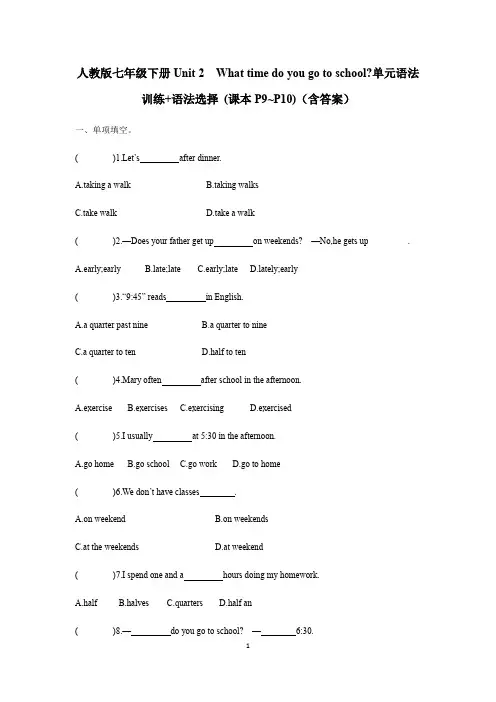
人教版七年级下册Unit 2What time do you go to school?单元语法训练+语法选择(课本P9~P10)(含答案)一、单项填空。
( )1.Let’s after dinner.A.taking a walkB.taking walksC.take walkD.take a walk( )2.—Does your father get up on weekends?—No,he gets up .A.early;earlyte;lateC.early;latetely;early( )3.“9:45” reads in English.A.a quarter past nineB.a quarter to nineC.a quarter to tenD.half to ten( )4.Mary often after school in the afternoon.A.exerciseB.exercisesC.exercisingD.exercised( )5.I usually at 5:30 in the afternoon.A.go homeB.go schoolC.go workD.go to home( )6.We don’t have classes.A.on weekendB.on weekendsC.at the weekendsD.at weekend( )7.I spend one and a hours doing my homework.A.halfB.halvesC.quartersD.half an( )8.—do you go to school?—6:30.A.How; AtB.When; InC.When; OnD.What time; At( )9.The little boy can after he gets up.A.get dressB.get dressedC.go dressedD.get dressing( )10.We have many classes school days.A.onB.inC.atD.for二、完成句子,词数不限。
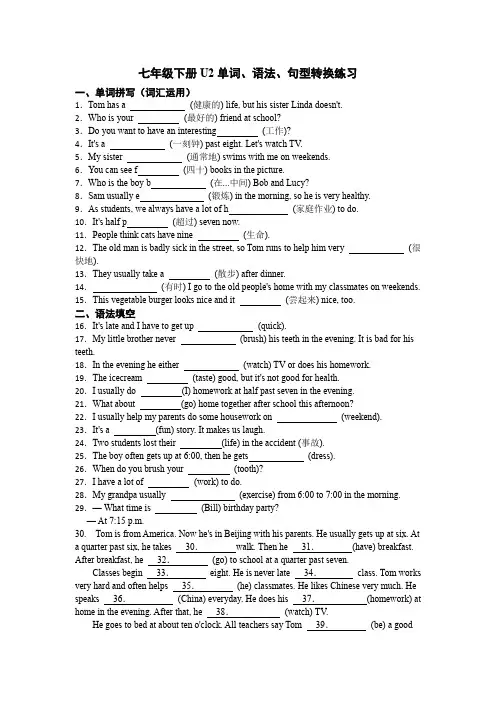
七年级下册U2单词、语法、句型转换练习一、单词拼写(词汇运用)1.Tom has a (健康的) life, but his sister Linda doesn't.2.Who is your (最好的) friend at school?3.Do you want to have an interesting(工作)?4.It's a (一刻钟) past eight. Let's watch TV.5.My sister (通常地) swims with me on weekends.6.You can see f(四十) books in the picture.7.Who is the boy b(在...中间) Bob and Lucy?8.Sam usually e(锻炼) in the morning, so he is very healthy.9.As students, we always have a lot of h(家庭作业) to do.10.It's half p(超过) seven now.11.People think cats have nine (生命).12.The old man is badly sick in the street, so Tom runs to help him very (很快地).13.They usually take a (散步) after dinner.14.(有时) I go to the old people's home with my classmates on weekends. 15.This vegetable burger looks nice and it (尝起来) nice, too.二、语法填空16.It's late and I have to get up (quick).17.My little brother never (brush) his teeth in the evening. It is bad for his teeth.18.In the evening he either (watch) TV or does his homework.19.The icecream (taste) good, but it's not good for health.20.I usually do (I) homework at half past seven in the evening.21.What about (go) home together after school this afternoon?22.I usually help my parents do some housework on (weekend).23.It's a (fun) story. It makes us laugh.24.Two students lost their (life) in the accident (事故).25.The boy often gets up at 6:00, then he gets(dress).26.When do you brush your (tooth)?27.I have a lot of (work) to do.28.My grandpa usually (exercise) from 6:00 to 7:00 in the morning. 29.— What time is (Bill) birthday party?— At 7:15 p.m.30. Tom is from America. Now he's in Beijing with his parents. He usually gets up at six. Ata quarter past six, he takes 30.walk. Then he 31.(have) breakfast. After breakfast, he 32.(go) to school at a quarter past seven.Classes begin 33.eight. He is never late 34.class. Tom works very hard and often helps 35.(he) classmates. He likes Chinese very much. He speaks 36.(China) everyday. He does his 37.(homework) at home in the evening. After that, he 38.(watch) TV.He goes to bed at about ten o'clock. All teachers say Tom 39.(be) a goodstudent.三、句型转换(1)Jane never drinks milk.(改为一般疑问句),Jane __________ __________milk?(2)Kate always gets home late.(改为否定句)Kate __________ __________home late.(3)He usually does his homework after school.(用They替换He改写句子)__________ usually __________ __________ __________after school.(4)We have a book sale on weekends.(对划线部分提问)__________ __________ you have a book sale?(5)It's eight thirtyfive now.(对划线部分提问)__________ __________ __________ __________now?(6)Jane usually gets up at half past five in the morning.(对画线部分提问)__________ __________ __________ Jane usually up in the morning?(7)Mary's father works in a hospital.(改为一般疑问句)__________ Mary's father__________ in a hospital?(8)I usually exercise in the morning. (对画线部分提问)__________ __________ you usually exercise?(9)Alice always gets up early.(改为否定句)Alice __________ gets up early.(10)They often go to school at half past seven in the morning.(用he改写句子)He often __________ __________ __________ at half past seven in the morning.七年级下册U2进门考一、单词拼写(词汇运用)1.Tom has a healthy(健康的) life, but his sister Linda doesn't.2.Who is your best (最好的) friend at school?3.Do you want to have an interesting job (工作)?4.It's a quarter(一刻钟) past eight. Let's watch TV.5.My sister usually(通常地) swims with me on weekends.6.You can see forty(四十) books in the picture.7.Who is the boy between(在...中间) Bob and Lucy?8.Sam usually exercises (锻炼) in the morning, so he is very healthy. 9.As students, we always have a lot of homework (家庭作业) to do. 10.It's half past (超过) seven now.11.People think cats have nine lives (生命).12.The old man is badly sick in the street, so Tom runs to help him very quickly (很快地).13.They usually take a walk (散步) after dinner.14.Sometimes (有时) I go to the old people's home with my classmates on weekends.15.This vegetable burger looks nice and it tastes (尝起来) nice, too.二、语法填空16.It's late and I have to get up quickly(quick).17.My little brother never brushes (brush) his teeth in the evening. It is bad for his teeth.18.In the evening he either watches(watch) TV or does his homework. 19.The icecream tastes (taste) good, but it's not good for health.20.I usually do my (I) homework at half past seven in the evening.21.What about going(go) home together after school this afternoon?22.I usually help my parents do some housework on weekends (weekend). 23.It's a funny (fun) story. It makes us laugh.24.Two students lost their lives (life) in the accident (事故).25.The boy often gets up at 6:00, then he gets dressed (dress).26.When do you brush your teeth (tooth)?27.I have a lot of work (work) to do.28.My grandpa usually exercises(exercise) from 6:00 to 7:00 in the morning.29.— What time is Bill’s (Bill) birthday party?— At 7:15 p.m.30. Tom is from America. Now he's in Beijing with his parents. He usually gets up at six. Ata quarter past six, he takes 30.a walk. Then he 31.has (have) breakfast. After breakfast, he 32.goes (go) to school at a quarter past seven.Classes begin 33.at eight. He is never late 34.for class. Tom works very hard and often helps 35.his (he) classmates. He likes Chinese very much. He speaks 36.Chinese (China) everyday. He does his 37.homework(homework) at home in the evening. After that, he 38.watches (watch) TV.He goes to bed at about ten o'clock. All teachers say Tom 39.is (be) a good student.三、句型转换(1)Jane never drinks milk.(改为一般疑问句),Does Jane ___never_______ ____drink______milk?(2)Kate always gets home late.(改为否定句)Kate _____never_____ _____gets_____home late.(3)He usually does his homework after school.(用They替换He改写句子)_____They_____ usually ______do ____ ____their______ ____homework______after school.(4)We have a book sale on weekends.(对划线部分提问)_____When_____ ____do______ you have a book sale?(5)It's eight thirtyfive now.(对划线部分提问)_____What_____ ____time______ _____is_____ ______it____now?(6)Jane usually gets up at half past five in the morning.(对画线部分提问)_____What_____ _____time_____ _____does_____ Jane usually get up in the morning?(7)Mary's father works in a hospital.(改为一般疑问句)____Does______ Mary's father_____work_____ in a hospital?(8)I usually exercise in the morning. (对画线部分提问)______When____ _____do_____ you usually exercise?(9)Alice always gets up early.(改为否定句)Alice ____never______ gets up early.(10)They often go to school at half past seven in the morning.(用he改写句子) He often ____goes______ _____to_____ ____school______ at half past seven in the morning.。
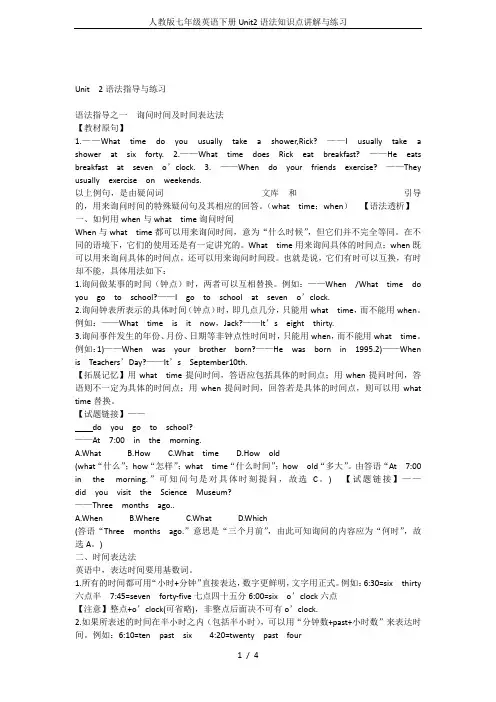
Unit2语法指导与练习语法指导之一询问时间及时间表达法【教材原句】1.——What time do you usually take a shower,Rick?——I usually take a shower at six forty.2.——What time does Rick eat breakfast?——He eats breakfast at seven o’clock.3.——When do your friends exercise?——They usually exercise on weekends.以上例句,是由疑问词文库和引导的,用来询问时间的特殊疑问句及其相应的回答。
(what time;when)【语法透析】一、如何用when与what time询问时间When与what time都可以用来询问时间,意为“什么时候”,但它们并不完全等同。
在不同的语境下,它们的使用还是有一定讲究的。
What time用来询问具体的时间点;when既可以用来询问具体的时间点,还可以用来询问时间段。
也就是说,它们有时可以互换,有时却不能,具体用法如下:1.询问做某事的时间(钟点)时,两者可以互相替换。
例如:——When/What time do you go to school?——I go to school at seven o’clock.2.询问钟表所表示的具体时间(钟点)时,即几点几分,只能用what time,而不能用when。
例如:——What time is it now,Jack?——It’s eight thirty.3.询问事件发生的年份、月份、日期等非钟点性时间时,只能用when,而不能用what time。
例如:1)——When was your brother born?——He was born in1995.2)——When is Teachers’Day?——It’s September10th.【拓展记忆】用what time提问时间,答语应包括具体的时间点;用when提问时间,答语则不一定为具体的时间点;用when提问时间,回答若是具体的时间点,则可以用what time替换。
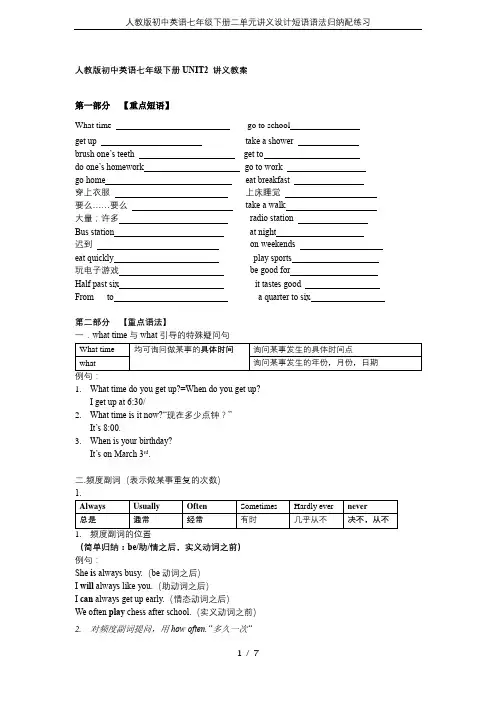
人教版初中英语七年级下册UNIT2 讲义教案第一部分【重点短语】What time go to schoolget up take a shower brush one’s teeth get todo one’s homework go to workgo home eat breakfast穿上衣服上床睡觉要么……要么take a walk大量;许多radio station Bus station at night迟到on weekends eat quickly play sports玩电子游戏be good for Half past six it tastes good From to a quarter to six第二部分【重点语法】1.What time do you get up?=When do you get up?I get up at 6:30/2.What time is it now?“现在多少点钟?”It’s 8:00.3.When is your birthday?It’s on March 3rd.二.频度副词(表示做某事重复的次数)(简单归纳:be/助/情之后,实义动词之前)例句:She is always busy.(be动词之后)I will always like you.(助动词之后)I can always get up early.(情态动词之后)We often play chess after school.(实义动词之前)2.对频度副词提问,用how often.“多久一次”-How often do you exercise? 你多久锻炼一次?-I never do exercise. 我从不。
【试一试】1.— is Mid-Autumn Day(中秋节)in China?—It’s August 15th.A.What time; onB.When; onC.What time; inD.When; in2.Do you often go fishing with your father?—No, .I don't like fishing.A.neverB.alwaysuallyD.everyday三.时间表达法整点法:at 6:00 → at six/at six o’clock顺读法:先时钟后分钟的顺序6:20 six twenty 3:45逆读法:先分钟后时钟的顺序①分钟数小于等于30:“past”.表示“几点过了几分” (分钟数+past+时钟)Twenty past one Half past six a quarter past one②分钟数大于30:“to”,表示“差几分到几点”[(60-分钟数)+to+(时钟+1)] Five to six 5:55 ten to six 8:45第三部分综合练习题一.单项填空。
一轮复习:七下U2 词汇+语法讲解【单词默写】【单词变形】【单词变性】funny形容词变名词_____________ quickly副词变形容词_____________ usually 副词变形容词_____________ life名词变动词_____________clean动词变名词_____________run动词变名词_____________walk动词变名词_____________work动词变名词_____________【一词多义】1. either _______________ __________________I don’t know it, either.Either you or I can go to the cinema tonight.2. up ____________ _____________ _________________He is up there, on the top of the mountain.Mary has eaten up all the cake.After knowing the problem, Mary quickly thought up new ideas to solve it.3. dress _________________ _______________ _________________My mother sent me a dress on my fifteenth birthday.I can dress myself now.Mary is dressed in red today.4. quarter ______________ ____________It’s about a quarter to five now.One quarter of the students come from China.5. taste ___________ ____________The dish has a good taste, I want more.The dish tastes delicious.6. past ____________ ___________ _____________ _________________ It’s about five past five. The students my go home.I walked past a cafe yesterday.In the past, I used to be really shy.In the past few years, China has greatly changed.7. run ____________ ___________ ______________Mary runs quickly. She wants to be a runner.The boss decides to run a new shoe shop next year.Buses run from Hangzhou to Ningbo every thirty minutes.8. walk __________ _________ _______ _________________Mary likes to walk outside after supper.Mary is walking her dog now.Mary used to take a walk after supper.It’s about three minutes’ walk from my home to school.9. work ___________ __________ __________ _____________The machine doesn't work well.He works in a big factory.Mark Twain has many great works.Mary need some work to make money.10. exercise ____________ ______________ _____________ In school, we usually need do eye exercises on the third class. He exercises a lot every day to keep fit.You need to do exercise every day to keep fit.11. clean ___________ _______________After cleaning the classroom, students felt really tired.The classroom looks vvery clean.【词汇用法】1. clean: adj./sth. Is clean/v./clean sp./clean up/clean off2. either: adv./not…either/either…or3. taste: v./taste +adj./n./a good taste相关词辨析: sound vs. look vs. taste vs. smell vs. feel sound: sound+adj.look: look+adj.taste: taste+adj.smell: smell+adj.feel: feel+adj.4. dress: vt./dress oneself/dress sb./be dressed in/get dressed in近义词辨析: dress vs. put on vs. wear vs. be on vs. be indress: vt./dress oneself/dress sb./be dressed in/get dressed input on: vt./put on sth./表示动作wear: vt./ wear clothes/a necklace/a watch/a pair of glasses/a smile表示状态be on: sth. be on sb.be in: sb. be in sth.5. either: either…or/就近原则【攻占语法】副词(频度副词)1. 副词的分类: ______________ _____________ ______________ ______________2. 副词的位置: 频度副词放在______________ 和_______________ 的后面,______________的前面3. 频度副词的用法:0%100%_____________________________________________________________________________4. 频度的表达方式:一天三次_______________每隔四年__________________每隔一天_______________【词汇练习】1.The b ________ of the four seasons is spring while a year starts with January.2.Don’t forget to b ________ your teeth after meals.3.After getting d ________, he begins to wash his face and brush his teeth every morning.4.The e ________ kids learn to be independent, the better it is for their future.5.He has lived in Shanghai and Beijing, but he doesn't like e ________ of them.6. E ________ is really important for everyone and good for health.7.Our class is made up of f ________ students, twenty-two boys and twenty-eight girls.8.Mom is thirty-nine years old now and next year she will be f ________.9.My cousin Li Jing is the f ________ person I know. She always makes us laugh.10.Look at this g ________ of students playing beach volleyball. They are from Wenlan Middle school.11.—The apple is big and you can’t eat it all, John!—Then, let’s cut it into h ________.12.I don’t think the sixteen-year-olds should be allowed to have part-time j ________. They need time to dohomework.13.As a doctor, he saves lots of l ________ every year.14.Jack is getting fatter because he n ________ does sports in his free time.15.When summer comes, days become longer and n ________ become shorter.16.Rick sometimes plays tennis at six o ________.17.Joe was playing with a dog when I walked p ________ his small house.18.Do you have lunch at a q ________ past twelve?19.Cleaning the classroom is not difficult. If we do the work every day, we can finish it q ________.20.It's time for lunch. All the students are r________ out of the classroom, it is dangerous for them.21.After running, it feels so comfortable to take a s ________.22.My mother likes drinking tea, though s ________ she drinks coffee.23.There is a bus s ________ at the second crossing. You can wait the bus there.24.I really know some junk food is not good for my health, but it t ________ good!25.The apple pie is really t _______. I’d like one more.26.It’s a good habit to brush our t ________ twice a day.27.He stayed u ________ playing games on computer last night, which made him feel sleepy in class.28.I u ________ felt shy when I was young, but now, I am much more outgoing.29.Taking a w ________ after meals is a good habit.30.Reader Digest is a w____________ read magazine. People all over the world know it and love it.【参考答案】【单词变形】【单词变性】funny形容词变名词funquickly副词变形容词quickusually 副词变形容词usualylife名词变动词liveclean动词变名词cleanerrun动词变名词runnerwalk动词变名词walkerwork动词变名词works【一词多义】1. either 也要么I don’t know it, either.Either you or I can go to the cinema tonight.2. up 在上面结束想出He is up there, on the top of the mountain.Mary has eaten up all the cake.After knowing the problem, Mary quickly thought up new ideas to solve it.3. dress 女裙给某人穿衣服穿着My mother sent me a dress on my fifteenth birthday.I can dress myself now.Mary is dressed in red today.4. quarter 一刻钟25%It’s about a quarter to five now.One quarter of the students come from China.5. taste 味道尝起来The dish has a good taste, I want more.The dish tastes delicious.6. past 超过经过过去过去的It’s about five past five. The students my go home.I walked past a cafe yesterday.In the past, I used to be really shy.In the past few years, China has greatly changed.7. run 跑步经营运行Mary runs quickly. She wants to be a runner.The boss decides to run a new shoe shop next year. Buses run from Hangzhou to Ningbo every thirty minutes.8. walk 走路散步散步路程Mary likes to walk outside after supper.Mary is walking her dog now.Mary used to take a walk after supper.It’s about three minutes’ walk from my home to school.9. work 运行工作(v.) 著作工作(n.)The machine doesn't work well.He works in a big factory.Mark Twain has many great works.Mary need some work to make money.10. exercise 操锻炼(v.)锻炼(n.)In school, we usually need do eye exercises on the third class.He exercises a lot every day to keep fit.You need to do exercise every day to keep fit.11. clean 打扫干净的After cleaning the classroom, students felt really tired.The classroom looks vvery clean.1. 副词的分类: 频度副词修饰性副词连接性副词地点副词程度副词2. 副词的位置: 频度副词放在be动词和情态动词的后面,实义动词的前面3. 频度副词的用法:0%100%never hardly ever sometimes usually often frequently always4. 频度的表达方式:一天三次three times a day每隔四年every four years每隔一天every other day【词语练习】Best bring dressed earlier either exercise fifty forty funniest group halves jobs lives never nights o’clock past quarter quickly running shower sometimes stop tastes tasty up usually walk widely。
【课堂·单元跟踪练】初中英语人教版(Go for it)七年级下册Unit 2 What time do you go to school?同步章节测试一、单词拼写(单句)1.We must walk q ,or (否则)we'll be late.2.Alan lost his l in the earthquake(地震).3.—John,do you go to bed e in the evening?—Yeah!I usually go to bed at 9:00.4.—Where does your mother work,Sally?—She works at a radio s.5.The boy is 2 years old.He can't get d .二、语法填空(单句)6.She (have)a shower every day.7.Jerry (watch)TV on Saturday evening.8.She wants (clean)her room.9.She (run)to the class everyday.10.Can he (go)home after school?11.Let's take (walk)together.12.My father and I like (run)in the evening.三、句子翻译13.他有一份有趣的工作,他上班从来不迟到的。
He has , He is14.我有时候打篮球达半小时。
I play basketball15.这是你的衣服,快去穿好。
Here are your clothes.Go and16.我要么去游泳要么打网球。
I go swimming play tennis.四、语法填空(短文)语法填空。
I have a cousin.Her name is Mary.She has a very 17.(health)habit.She usually gets up18.half past six in the morning.Then she 19.(brush)her teeth.At goes to about ten to seven,she eats breakfast with 20.(she)parents.And then school by bike at a quarter past seven. She has four 21.(class)in she the morning at school. At twelve o'clock,she22.(have)lunch at school.She likes 23.(eat)some vegetables and fish for lunch.She eats very 24.(quick).There are three lessons in the afternoon.Her favorite subject is music, 25.she likes singing very much.At about half past four,she goes back home.After dinner,sometimes she takes26.walk with her dog.Sometimes she watches TV.At nine thirty,she goes to bed.语法填空。
七年级英语下册Unit2语法练习班级考号姓名总分(一般现在时的用法)一、用括号中所给单词的适当形式填空。
1.They often (go) to school at half past six.2.Alice (do) her homework at school every day.3. Bob(take) a shower in the evening or in the morning?4.Whatyour mother often (do) after dinner?5.What time Jack and his sister (eat) lunch?1.He gets up and his teeth at six o'clock in the morning.2.My parents always a walk after dinner.3.Ice-cream good, but it isn't healthy.4.They their classroom every day.三、单项选择。
1.Her sister up at 6:30 every day.A.getB.getsC.is gettingD.are getting2.- do you get to school?- At eight o'clock.A.What timeB.WhereC.HowD.Why3.Does your friend Jim at 5:30 inthe afternoon?A.exercisesB.to exerciseC.exercisingD.exercise4.- What time does Lisa after school?- At six o'clock.A.do her homeworkB.does her homeworkC.do her homeworksD.does her homeworks5.Bob his homework Sundays.A.doesn't; onB.don't do; inC.doesn't do; onD.doesn't; in6.- What does your brother after school?- He usually basketball.A.do; playsB.does; playC.do;playD.does;plays四、句型转换。
七年级下册英语Unit2重难点突破与语法精练重难点突破考点一:work&job选用work或job并用其正确形式填空。
1. My sister finds a good in Shanghai2. When can you finish the , John?3. Mr. Brown at a radio station.4. The new supermarket has lots of for the people in town.5. Mrs. Green is very kind and we all like to with her.考点二: exercise的用法根据汉语意思完成句子。
1.我们必须吃健康的食物并且多锻炼。
We must eat healthy food and .2.你经常锻炼保持体形吗?Do you often to stay in shape?3.学生们每天八点做早操。
The students at eight every morning.4.李明擅长数学,因为他每天做许多练习题。
Li Ming is good at math, because he every day.考点三:辨析at,in,on与for用适当的介词填空。
1. -What time do you watch TV every day?- I watch TV 7:30 p. m.2. My friend Lucy usually exercises the morning.3. Linda doesn't eat lunch noon.4. The basketball game starts 10:00 on Friday morning.5. Jenny does her homework an hour every day.考点四:辨析also,too与either单项选择。
( )1. My mother doesn’t eat hamburgers. I don't, .A. andB. tooC. either D also( )2.Do you like sports?-Yes, I do. And I like English, .A. too; eitherB. also; eitherC. also; tooD. too; also( )3. We have only one computer. you or he can play with it.A. OnlyB. EitherC. ButD. Not考点五: taste的用法根据汉语意思完成句子。
七下U2单元语法知识点汇总+单元作文范文语法专题:what time 、when 引导的特殊疑问句一、用法 what time 翻译为“几点”问的是具体的时间,一般回答要具体到小时。
—What time do you go to school? —I go to school at half past seven o’clock.回答具体到点钟,注意在几点前边的介词用at 。
when 也是对时间的提问,但与what time 的区别是:用when 提问,回答既可以是具体的时间,也可以是不具体的时间,如:in the morning ,last year ,in 1998等范围大的时间,例如: —When does he take a shower ? —He takes a shower in the morning.也可用具体时间:I take a shower at 6 o’clock in the morning.【例】完成下列对话。
(1)____________________ is it? It’s seven o’clock. (2)____________________ born?He was born in 1992.(3)____________________ do you get up? It’s five o’clock. (4)____________________ does Jane do her homework?She does it in the evening. (5)____________________ do you exercise?At half past eight at night.二、句子的构成1. 对句子的主语提问,其语序是:疑问词+谓语+其他?(整句是陈述句语序) Swimming is my favourite.What is your favourite? 主语 谓语主语 谓语2. 对句子其他部分提问,其语序是:Be(Am;Is;Are;Was;Were)+主语+其他?特殊疑问词(+被修饰名词)+一般疑问句助动词/情态动词+动词原形+其他?【例】完成图片对话。
人教版七年级英语下册unit2解析词汇、句型解析及练习Unit 2 What time do you go to school?Unit2 知识梳理◆短语归纳1. what time 几点2. go to school 去上学 3. get up 起床4. take a shower 洗淋浴 5. brush teeth 刷牙 6. get to 到达7. do homework 做家庭作业8. go to work 去上班9. go home 回家10. eat breakfast 吃早饭11. get dressed 穿上衣服12. get home 到家13. either…or… 要么…要么…14. go to bed 上床睡觉15. in the morning/afternoon/evening 在上午/下午/晚上16. take a walk 散步17. lots of=a lot of 许多,大量18. radio station 广播电台19. at night 在晚上20. be late for=arrive late for 迟到◆用法集萃 1. at + 具体时间点在几点(几分)2. eatbreakfast/lunch/dinner 吃早饭/午饭/晚饭 3. thirty/half past +基数词…点半 4. fifteen/a quarter to +基数词差一刻到…点 5. take a/an+名词从事…活动 6. from…to… 从…到…7. need to do sth 需要做某事◆典句必背1. —What time do you usually get up? 你通常几点钟起床?—I usually get up at six thirty. 我通常6:30起床。
2. That’s a funny time for breakfast. 那是个有趣的早餐时间。
人教版初中英语七年级下册Unit2语法指导与练习Unit 2 What time do you go to school?Unit 2语法指导与练习语法指导之一询问时间及时间表达法【教材原句】1.——What time do you usually take a shower,Rick?——I usually take a shower at six forty.2.——What time does Rick eat breakfast?——He eats breakfast at seven o’clock.3. ——When do your friends exercise?——They usually exercise on weekends.以上例句,是由疑问词和引导的,用来询问时间的特殊疑问句及其相应的回答。
(what time;when)【语法透析】一、如何用when与what time询问时间When与what time都可以用来询问时间,意为“什么时候”,但它们并不完全等同。
在不同的语境下,它们的使用还是有一定讲究的。
What time用来询问具体的时间点;when既可以用来询问具体的时间点,还可以用来询问时间段。
也就是说,它们有时可以互换,有时却不能,具体用法如下:1.询问做某事的时间(钟点)时,两者可以互相替换。
例如:——When /What time do you go to school?——I go to school at seven o’clock.2.询问钟表所表示的具体时间(钟点)时,即几点几分,只能用what time,而不能用when。
例如:——What time is it now,Jack?——It’s eight thirty.3.询问事件发生的年份、月份、日期等非钟点性时间时,只能用when,而不能用what time。
例如:1)——When was your brother born?——He was born in 1995.2)——When is Teachers’Day?——It’s September10th.【拓展记忆】用what time提问时间,答语应包括具体的时间点;用when提问时间,答语则不一定为具体的时间点;用when提问时间,回答若是具体的时间点,则可以用what time替换。
【试题链接】——do you go to school?——At 7:00 in the morning.A.WhatB.HowC.What timeD.How old(what“什么”;how“怎样”;what time“什么时间”;how old“多大”。
由答语“At 7:00 in the morning.”可知问句是对具体时刻提问,故选C。
)【试题链接】——did you visit the Science Museum?——Three months ago..A.WhenB.WhereC.WhatD.Which(答语“Three months ago.”意思是“三个月前”,由此可知询问的内容应为“何时”,故选A。
)二、时间表达法英语中,表达时间要用基数词。
1.所有的时间都可用“小时+分钟”直接表达,数字更鲜明,文字用正式。
例如:6:30=six thirty六点半7:45=seven forty-five七点四十五分6:00=six o’clock 六点【注意】整点+o’clock(可省略),非整点后面决不可有o’clock.2.如果所表述的时间在半小时之内(包括半小时),可以用“分钟数+past+小时数”来表达时间。
例如:6:10=ten past six 4:20=twenty past four10:25=twenty-five past ten 11:30=half past eleven3.如果所表述的时间在半小时之外,可以用“(相差的)分钟+to+(下一个)小时数”来表述时间。
例如:10:35=twenty-five to eleven 5:50=ten to six9:49=eleven to ten4.一刻(十五分)也可用quarter来表达。
例如:1:15=a quarter past one3:45=a quarter to four【注意】在时间前面应用介词at来表示“在……时间”的意思。
若表示的时间不够准确,可在时间前加上介词about。
在时间后加上am或a.m.(in the morning)表明是上午;在时间后加上pm或p.m.(in the afternoom)表明是下午。
例如:at about eight在大约八点at nine am在上午九点at about five thirty-five p.m.大约在下午五点三十五分【试题链接】——When did the eatthquake in Lushan happen?——It happened 8:20 the morning of April20,2013.A.on;inB.at;inC.at;onD.on;on(某时刻前用介词at,具体到某天的上午、下午或晚上用介词on,故选C。
)语法指导之二频度副词【教材原句】1.I usually take a shower at six forty2.They always get dressed at seven twenty.3.Anna never eats breakfast.4.After school,I sometimes play basketball for half an hour.以上几句中出现的(通常),(总是,一直),(从不)和(有时)都是表示频率的副词,叫频度副词。
(usually;always;never;sometimes)【语法透析】频度副词的含义频度副词是副词的一种,通常和一般现在时连用,表示现在经常或反复发生的动作。
本单元出现的频度副词有always,usually,sometimes,never。
always 是频度最大的词,意为“总是;永远”;usually意为“通常”,即很少有例外,频度仅次于always;sometimes意为“有时”;never意为“从不”。
例如:John always comes late.约翰总是迟到。
I usually go to school by bus.我通常乘公共汽车上学。
He sometimes plays volleyball after school.他有时放学后打排球。
I never drink milk。
我从不喝牛奶。
【拓展记忆】①频度副词一般放在实义动词之前,be动词、助动词或情态动词之后。
例如:We never eat junt food.我们从不吃垃圾食品。
Lucy is sometimes verybusy.露西有时很忙。
②对频度副词提问时,用how often。
例如:1)——How often do you exercise?你多久锻炼一次?——Hardly never.几乎从不。
2)——How often do you play chess after school?——I always play chess after school.【试题链接】Though they are far away from school,the children who live in mountains go to school on foot.A.everB.alwaysC.neverD.hardly ever(句意为“尽管他们离学校很远,但住在大山里的那些孩子总是步行去上学”。
ever意为“曾经”;always意为“一直,总是”;never意为“从不”;hardly ever 意为“几乎很少”。
由句意可知选B。
)语法指导之三一般现在时的判断当我们遇到一个句子,要判断这一个句子用不用一般现在时,可以从以下几方面下手:1.当句中用到副词often(经常),usually(通常),sometimes(有时)或always (总是)等,同时该句中无表示过去或将来的时间状语时,那么这个句子就用一般现在时。
例如:The student often plays basketball at school. My friends always help me with my Chinese. Sometimes Jim plays the piano after lunch.2.一般现在时,常和类似every day,in the morning,on Sunday,at eight o’clock,in the afternoon等具有周期性的时间状语连用。
例如:The teacher takes the number 17 bus to school in the morning. I watch TV every day.3.一般表示某人或某物现阶段的特征、性质、能力等以及现实社会和自然界中的客观现象,包括真理性的内容时,用一般现在时的句子表达。
例如:The girl is beautiful(漂亮的).She works in a shop. The earth goes around the sun. EXERCISES:一、选择填空。
()1.——do you usually go shopping?——On Sundays.A.WhatB. WhenC.WhereD.Why()2.——does Lily have lunch at school?——At twelve o’clock.A.WhatB. HowC.What timeD.How much()3.——Have you ever been to Disneyland?——No, .I hope I can go there next year.A.alwaysB. sometimesC.neverD.often()4.——Ms. Lin is very popular among the students.——Yes.Her classes are lively and interesting.A.alwaysB. sometimesC.hardlyD.never()5.——Do you often go fishing with your father?——No, . I don’t like fishing at all.A.neverB.alwaysuallyD.ever二、用所给词的适当形式填空。
1.Alice often (go) to school with her friends.2.Cindy (do)her homework at school.3. Mike (take)a shower in the evening or in the morning?4.What your mother often (do)after dinner?5.What time Jack (eat) lunch?6.Jim (not watch) TV on school days.7.Ann (want) to join the music club.8.Tom (like) eating ice-cream.9.She never (have) breakfast.10.My father (work)at a hospital.三、按要求完成句子。